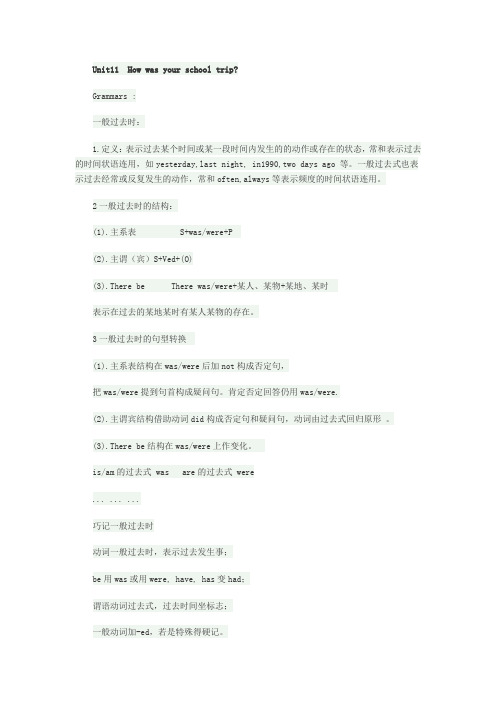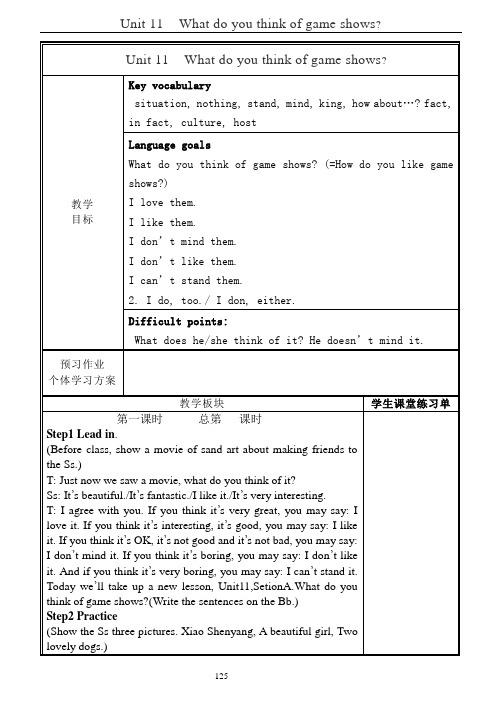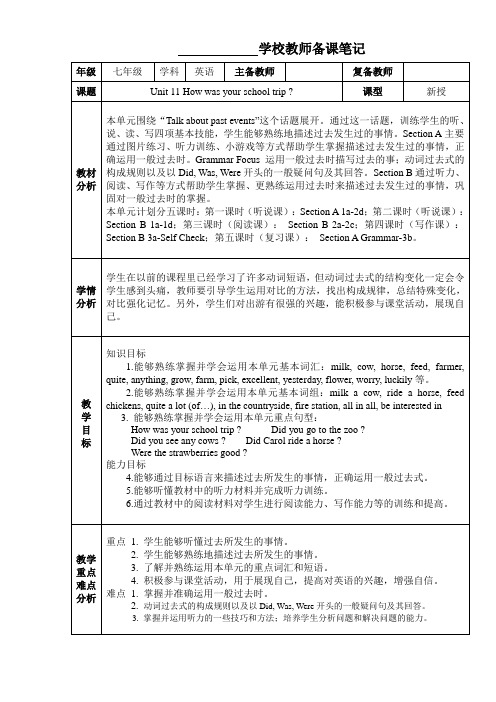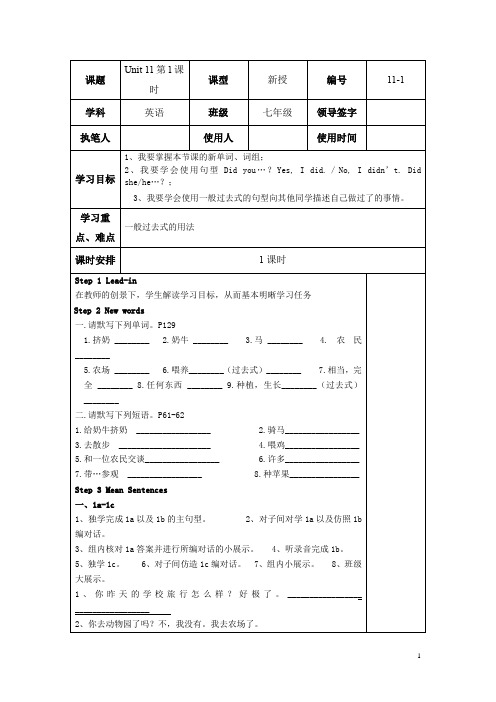最新人教版七年级英语下册教案 unit11 第6课时 教案
- 格式:doc
- 大小:56.50 KB
- 文档页数:4

Unit11 How was your school trip?Grammars :一般过去时:1.定义:表示过去某个时间或某一段时间内发生的的动作或存在的状态,常和表示过去的时间状语连用,如yesterday,last night, in1990,two days ago 等。
一般过去式也表示过去经常或反复发生的动作,常和often,always等表示频度的时间状语连用。
2一般过去时的结构:(1).主系表 S+was/were+P(2).主谓(宾)S+Ved+(O)(3).There be There was/were+某人、某物+某地、某时表示在过去的某地某时有某人某物的存在。
3一般过去时的句型转换(1).主系表结构在was/were后加not构成否定句,把was/were提到句首构成疑问句。
肯定否定回答仍用was/were.(2).主谓宾结构借助动词did构成否定句和疑问句,动词由过去式回归原形。
(3).There be结构在was/were上作变化。
is/am的过去式 was are的过去式 were... ... ...巧记一般过去时动词一般过去时,表示过去发生事;be用was或用were, have, has变had;谓语动词过去式,过去时间坐标志;一般动词加-ed,若是特殊得硬记。
否定句很简单,主语之后didn’t添;疑问句也不难,did放在主语前;如果谓语之前有did,谓语动词需还原;动词若是was,were,否定就把not添。
... ... ...小试身手把下列句子变成否定句,一般疑问句,肯否回答及对划线部分提问1.The air was clean yesterday.The air wasn't clean yesterday.Was the air clean yesterday?Yes, it was./ No,it wasn't.How was the air yesterday?2.Tom and Peter were at home last night.Tom and Peter weren't at home last night.Were Tom and Peter at home last night?Yes, they were./No.they weren't.Where were Tom and Peter last night.... ... ...ExercisesA: What ___ you do yesterday?B: I _____ to the movie.A: What ___ you do last weekend?B: I ___ my homework.What did you ___ last weekend?We ____________________How ___ your trip last weekend? It was boring.What did they ___ last weekend?They __________________How ____ the strawberries?They were delicious.... ... ...1a Match the phrases with the pictures.went for a walk milked a cowrode a horse fed chickenstalked with a farmer took some photosLanguage points1. Did you see any cows?Yes, I did. I saw quite a lot.quiet a lot 相当多+of+可数或不可数, 也可以单独使用。


人教版七下英语unit11 教案English: For the 7th-grade English Unit 11 "What's the matter?" of the People's Education Press curriculum, the teaching plan aims to facilitate students' comprehension and application of vocabulary related to health and illnesses, as well as to develop their ability to express concern and offer advice. The lesson begins with a warm-up activity to activate prior knowledge and engage students in the topic. This is followed by a vocabulary introduction section where key words related to health and illnesses are presented through various activities such as word association, matching exercises, and context-based examples. Subsequently, the teacher guides students through listening and speaking activities designed to reinforce the newly introduced vocabulary and encourage students to use it in meaningful contexts. Role-plays, dialogues, and group discussions are utilized to provide ample opportunities for students to practice expressing concerns and offering advice regarding health issues. Additionally, reading comprehension tasks are incorporated to enhance students' understanding of the topic and promote their reading skills. To consolidate learning, the lesson concludes with exercises that require students to apply the vocabulary andstructures learned in creative writing tasks or situational prompts. Throughout the lesson, multimedia resources, including audio recordings, visual aids, and interactive activities, are employed to cater to diverse learning styles and enhance engagement. The teaching plan is designed to foster a communicative and interactive learning environment where students feel motivated to participate actively and develop both their linguistic and interpersonal skills.中文翻译: 《人教版七年级英语第十一单元“怎么了?”的教学计划旨在帮助学生理解和运用与健康和疾病相关的词汇,并发展他们表达关心和提供建议的能力。



Unit 11 How was your school trip?Section B 3a — Self Check (P66)* 教师寄语:Travel is the road to knowledge. 旅行是知识之路。
【学习目标】【学习重点】:学习写自己的学校旅I、预习交流行日记。
【体验学习】:1. 根据图片和文章等,预测新课内容;2. 自学课文,勾画出重点和疑惑。
II、翻译官1. diary entry________________2.Really?___________________【课堂导学】:I、新课呈现Step1 Review & Lead-in1. Read 2b on P65 together.2. Write more verbs and their past forms in each group. Finish Self Check: Ex.1. Then give a summary about it.3. Finish Self Check: Ex.2: Complete the conversations with the correct forms of the verbs in the box.Step2 Presentation1. Look at the pictures in 3a. What are they doing in each picture?2. Complete Bob’s diary entry. Finish 3a. Check the answers.3. Complete Bob’s classmate Linda’s diary entry. Finish 3b. Check the answers.4. Read the two diary entries together.Step3 WritingNow write a diary entry for your own school trip. Explain if you liked it and why.II、合作交流Group work: 分析总结如何写出自己的学校旅行日记。
Unit 11 How was your school trip ?Period 6 Writing—Section B (3a-3c)一、教学目标:1. 知识与技能:检测学生看图说话的能力。
检测学生是否能运用一般过去时来写作日记,并简述理由。
检测学生能否正确描述过去的经历并恰当地表达自己的态度。
2. 情感目标:能过学习推送的范文,观察总结日记写作格式,通过对比分析,从3a和3b的范文中汲取写作的句型和表达来完成日记的写作。
3. 文化意识:学会用日记的方式表达自己的态度,保持身心健康。
二、教学重难点:1. 教学重点:一般过去时的恰当使用。
三、教学步骤:Step 1:1 RevisionRetell the diaries in 2b according the Mind Map.(平板推送)Step 2 : Preparation1. Make a prediction of the pictures in 3a. Lead-in activities and the type ofthe passage. Then complete Bob’s diary entry. At last, know the feeling ofhis trip.2. 3b Linda is Bob’s classmate. “Did Linda her school trip?”3. Read and compare 3a with 3b. Know that People may have different feelings about the same thing.Step 2 : Writing1. How to write a diary? What things should we talk about in a diary?(Date, place, like/dislike, activities, transportation)2. Now write a diary entry for your own school trip.(3c)Explain if you liked it or didn’t like it and why.Step 3 : Check1.Check the diary by himself/herself. Then check it in a group.2.Pick out the best to share with all the classmates.Step 4: HomeworkImprove and rewrite your own diary about your school trip.。
Unit 11 How was your school trip ?一、教学目标:1. 语言知识目标基本词汇:milk, cow, horse, feed, farmer, quite, anything, grow, farm, pick, excellent, coutryside, yesterday, flower, worry, luckily, sun, museum,fire, painting, exciting, lovely, expensive, cheap, slow, fast, robot,guide, gift, everything, interested, dark, hear基本词组:milk a cow, ride a horse, feed chickens, quite a lot (of…), in the countryside, fire station, all in all, be interested in基本句型:How was your school trip ? It was great !Did you go to the zoo ? No, I didn’t. I went to a farm.Did you see any cows ? Yes, I did. I saw quite a lot.Did Carol ride a horse ? No, s he didn’t. But she milked a cow.Were the strawberries good ? Yes, they were . No, they weren’t.2. 技能目标: 能运用一般过去时描写过去的事情3. 情感目标:学会客观地表达对事物的看法,培养乐观向上的性格二、教学重难点:1. 教学重点:一般过去时的判断及选用2. 教学难点:正确运用一般过去时三、教学步骤:Period 1Section A (1a-2d)Step 1 : Warming –up1 GreetingWho is on duty today ?Who was on duty yesterday ?What is the weather like today ?What was the weather like yesterday ?2 Song : Play the song “ Old MacDonald had a farm” and have Ss find out the animals in the songGet Ss answer like this : On the farm ,there are some ducks, cats,chickens, cows pigs,dogs and horses . They are animals.Step 2 : Presentation1 Show a picture and tell Ss: This is also a farm. Last week Carol and his classmates had a school trip. They went to the farm. What did they do on the farm? How was their school trip?2 Show some pictures again and try to get the past tense verbs expressions according to the pictures.(1) Show the picture and the question(2) Ask one student to answer the question.(3) All students read it toghter.Q:Did he ride a horse?A:Yes, he did. He rode a horse.Q:Did he milk a cow?A:Yes, he did. He milked a cow.Q:Did he ride a horse?A :No, he didn’t .Did he feed chickens?Yes, he did. He fed chickens.Did you go to the zoo?No, I didn’t. I went to a farm.Did you see any cows ?Yes, I did. I saw quite a lot.Did they pick any strawberries on the farm ?Yes, they did .How were the strawberries?They were delicious.Were the strawberries good?Yes, they were.No, they weren’t.How was your school trip ?It was great.Were the strawberries good ?Yes ,they were.No, they weren’t.Step 3 ExercisesStep 4 : Practice (Listening and speaking)1a Match the phrses with the pictures.1b Listen and circle the three things Carol did on her school trip in 1a.1c Ask and a nswer questions about Carol’s school trip.2a Listen and check the questions you hear.2b Listen again.Circle T for true or F for false2c Ask and answer questions about Carol’s visit to the farm.Step 5 :Tasks:1 Look at the pictures and practice the dialogueA:How was your school trip?B: It was …(boring/interesting/good/great…)A:What did you do on the school trip ?B:I went for a walk with my classmates.2 2d Role-play the conversation3.Groupwork: Make a survey. Ask your partners what they didlast week. Then give a reporter.Step 6 : Grammar Focus ( Get Ss read aloud )How was your school trip ? It was great !Did you go to the zoo ? No, I didn’t. I went to a farm.Did you see any cows ? Yes, I did. I saw quite a lot.Did Carol ride a horse ? No, s he didn’t. But she milked a cow.Were the strawberries good ? Yes, they were . No, they weren’t. Step 6 Summary and Language pointsStep 7 Exercises :Period 2Section A (Grammar Focus-3b)Step 1:1 GreetingHow are you today ?How were you yesteday ?How was your last school trip ?2 Free talk :T : Do you want to know some thing about your classmates’ school trip ?Now Ask your partner :What did you do on your school trip ? Then fillin the following chart.Step 2 :Pre-task :1.Look at the pictures and fill in the blanks.2.Write the past forms of the following verbs.3. Check the past forms .Then ask Ss to summerize the rules of past forms of theregular verbs.Then explain the rules of past forms of the regular verbsStep 3 While-task 3a1 Ask Ss to read the letters in 3a .2 Ask Ss to complete Jim’s letter on the left and Bill’s reply on the right.3 Check the answers .Ask Ss to pay attention to the past tenst verbs.4 Explain the language points5 Read the letters together.Step 4: Post-task1. Challenge:Ask Ss to fill in the blanks according to the pictures.2 Check the answers. Ask Ss to read the answers one by one.3 Have a student read the letter out aloud.4 Ask Ss to read the letter several times. Try to recite it.5 Groupwork: Make up a story. Each student adds a sentence.If he or she can’tadd a sentenec .He or she must sing an English song.You can begin like this:Last week I visited my aunt’s house.____________________________________________________________________________________________________________________________Step 5 Language points and ExercisesPeriod 3Section B (1a-2c)Step 1:1 GreetingWhat did you do yesterday ?How were you yesterday ?2 Review: GamesUse your imagation and make up a story. Each student adds a sentence.Ifhe or she can’t add a sentence,he or she must sing an English song.Step 2 :Preparation 1a1 Match the activities with the pictures.2 Check the answersStep 2 :Listening 1b 1c1 Listen and answer the questions.1 How was Jane’s trip ?2 How was Tony’s trip ?2 Check the answers.3 Listen again. What did Jane and Tony do on their last school trip ? CheckTony or Jane.Step 3:Speaking 1d1 What was your last school trip like ?Discuss it with your partner with the following words.2 Teach Ss to read the following words :interesting difficult lovely slowexciting boring cool hot luckylarge expensive terrible decilious great cheap fast3 Discuss like following conversation.A: I went to a farm on my last school trip.There are many animals on the farm.They are very lovely.B: That sounds great.A: How was your school trip ?B: It was __________A: How was the food there ?B: It was _____________A: How was the weather ?B: It was ___________Step 4: Prepatation2a Do the following words describe good things or bad things ? Put a √for good and an ×for bad . Leave a blank if they can mean both.Step 5 : Reading 2b,2c1 Read Helen’s and Jim’s diary e ntries and answer the questions in 2b2 Read the diaries again and complete the chart in 2cHow do Helen and Jim describe these things ?3 Check the answers .Ask Ss to pay attention to the past tenst verbs.4 Explain the language points5 Read the passages aloudStep 6 : Language points and exercises.Period 4Section B (3a-Self check )Step 1:1 GreetingHow are you feeling today?What did you do last night?How was your homework yesterday?2 Review : GamesUse your imagnation and make up a story. Each student adds a sentence.Ifhe or she can’t add a sentence,he or she must sing an English song.Step 2 : Preparation1.3a Look at the pictures of Bob’s school plete his diary entry.2. 3b Linda is Bob’s classmate. Complete her diary entry.Step 2 : Writing3c Now write a diary entry for your own school trip.Explain if you liked it or didn’t like it and why.Step 3 : Self-check1 Write more verbs and their past forms in each group.2 Complete the conversations with the correct forms of the verbs in the box.3 Check the answers4 Grammar: The Simple Past Tense 倡议书春回大地,万象更新。
How was your school trip?教案单元教材分析:I. Status and Function 地位和作用"Go for it!" is based on "Task-Based Language Teaching". It adheres to "The authenticity principle", "The form-function principle", "The task dependency principle" and "The principle of learning by doing". These principles all accord with the demands of curriculum focus.In Unit 5 and Unit 10 of Grade Seven (II), "Go for it!" students have learned "The Simple Past Tense". And it appears again in Unit 8 of Grade Eight (I). Unit 8 teaches students more about how to talk about events in the past. In addition, it gives affirmative and negative statements in the past tense, such as the sentence patterns "Did you see...?" "Were there...?" "Did you go...?"As the first part of Unit 8, Section A opens with a picture presenting the last school trip in the aquarium and continues with several step-by-step practice activities, which are all good for students to master "The Simple Past Tense". Doing well in Section A will help students integrate the new target language with that in Section B. Thus, they can describe the events in the past freely and foster their own ability of reflecting and practicing.II. Teaching Objectives单元目标Teaching objective is the beginning and aim of teaching activities. According to the overall goal of the English elementary course— improve students' synthetic ability of language application, which should be based on the development of students' "Language knowledge", "Language skills", "Character building", "Learning strategies" and "Cross-cultural awareness". The teaching objectives are described as follows:(I). Knowledge objectivesi. Master the simple past tense of regular and irregular verbsii. Recite the new words and expressions about the last school trip in the aquarium, including their pronunciation and intonationiii. Master the key sentences and learn how to talk about the past events(II). Ability objectivesi. Understand the two dialogues and gain the information to foster the listening skillsii. Use the discourse markers to organize sentences together to form a short story and interview others to foster the speaking skillsiii. Understand the reading material and find the answers on the wall to foster the reading skills iv. Write down the correct sentences to foster the writing skills1. 学习询问和谈论过去发生的事情。